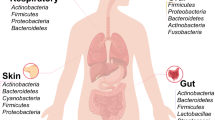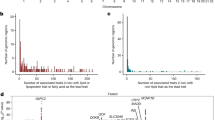Abstract
Background:
A high intake of n-3 polyunsaturated fatty acids (PUFAs), mainly present in fish, may be associated with decreased inflammation. Previous intervention studies on fish PUFA and inflammatory markers in healthy individuals did not analyze a broad spectrum of inflammatory cytokines, chemokines and cell adhesion molecules, or their interrelationships. Therefore, we determined the effects of fish oil supplementation on 19 serum inflammatory markers and their interrelationships in healthy, middle-aged individuals.
Methods:
Individuals (n=77) aged 50–70 years completed a randomized, double-blind placebo-controlled intervention study. Participants received 3.5 g/day fish oil (1.5 g/day total n-3 PUFA) (n=39) or placebo (high oleic sunflower oil) (n=38) for 12 weeks. Serum concentrations of 19 inflammatory markers were determined using a multiplex immunoassay before and after intervention. Changes in concentrations were analyzed using analysis of covariance and differences in patterns in inflammatory markers between the fish oil and placebo group were analyzed by principal component analysis.
Results:
Fish oil supplementation did not significantly affect serum concentrations of cytokines, chemokines or cell adhesion molecules as compared with placebo. However, there was a trend for all inflammatory markers to increase after fish oil supplementation. PCA did not result in markedly distinctive patterns of inflammatory markers for the fish oil and placebo group.
Conclusion:
In conclusion, this 12-week randomized, double-blind placebo-controlled intervention trial did not show that 1.5 g/day n-3 PUFA significantly affected the serum inflammatory response in healthy individuals, nor did patterns of inflammatory markers. Thus, a healthy middle-aged population may not benefit from fish oil as an anti-inflammatory agent.
This is a preview of subscription content, access via your institution
Access options
Subscribe to this journal
Receive 12 print issues and online access
$259.00 per year
only $21.58 per issue
Buy this article
- Purchase on Springer Link
- Instant access to full article PDF
Prices may be subject to local taxes which are calculated during checkout


Similar content being viewed by others
References
Aickin M, Gensler H (1996). Adjusting for multiple testing when reporting research results: the Bonferroni vs Holm methods. Am J Public Health 86, 726–728.
Calder PC (1997). n-3 polyunsaturated fatty acids and cytokine production in health and disease. Ann Nutr Metab 41, 203–234.
Calder PC (2006). n-3 polyunsaturated fatty acids, inflammation, and inflammatory diseases. Am J Clin Nutr 83, 1505S–1519S.
Calder PC (2007). Immunological parameters: What do they mean? J Nutr 137, 773S–780S.
Calder PC, Grimble RF (2002). Polyunsaturated fatty acids, inflammation and immunity. Eur J Clin Nutr 56 (Suppl 3), S14–S19.
Cooper AL, Gibbons L, Horan MA, Little RA, Rothwell NJ (1993). Effect of dietary fish oil supplementation on fever and cytokine production in human volunteers. Clin Nutr 12, 321–328.
Damsgaard CT, Frokiaer H, Andersen AD, Lauritzen L (2008). Fish oil in combination with high or low intakes of linoleic acid lowers plasma triacylglycerols but does not affect other cardiovascular risk markers in healthy men. J Nutr 138, 1061–1066.
de Jager W, Prakken BJ, Bijlsma JW, Kuis W, Rijkers GT (2005). Improved multiplex immunoassay performance in human plasma and synovial fluid following removal of interfering heterophilic antibodies. J Immunol Methods 300, 124–135.
de Jager W, te Velthuis H, Prakken BJ, Kuis W, Rijkers GT (2003). Simultaneous detection of 15 human cytokines in a single sample of stimulated peripheral blood mononuclear cells. Clin Diagn Lab Immunol 10, 133–139.
Fritsche K (2006). Fatty acids as modulators of the immune response. Annu Rev Nutr 26, 45–73.
Fujioka S, Hamazaki K, Itomura M, Huan M, Nishizawa H, Sawazaki S et al. (2006). The effects of eicosapentaenoic acid-fortified food on inflammatory markers in healthy subjects--A randomized, placebo-controlled, double-blind study. J Nutr Sci Vitaminol (Tokyo) 52, 261–265.
Garson D, David G 2008. Factor analysis from statnotes: topics in multivariate analysis. http://www2.chass.ncsu.edu/garson/pa765/statnote.htm, editor.
Gearing AJ, Newman W (1993). Circulating adhesion molecules in disease. Immunol Today 14, 506–512.
Geelen A, Brouwer IA, Schouten EG, Kluft C, Katan MB, Zock PL (2004). Intake of n-3 fatty acids from fish does not lower serum concentrations of C-reactive protein in healthy subjects. Eur J Clin Nutr 58, 1440–1442.
Geelen A, Zock PL, Swenne CA, Brouwer IA, Schouten EG, Katan MB (2003). Effect of n-3 fatty acids on heart rate variability and baroreflex sensitivity in middle-aged subjects. Am Heart J 146, E4.
Hughes DA, Pinder AC, Piper Z, Johnson IT, Lund EK (1996). Fish oil supplementation inhibits the expression of major histocompatibility complex class II molecules and adhesion molecules on human monocytes. Am J Clin Nutr 63, 267–272.
Jellema A, Plat J, Mensink RP (2004). Weight reduction, but not a moderate intake of fish oil, lowers concentrations of inflammatory markers and PAI-1 antigen in obese men during the fasting and postprandial state. Eur J Clin Invest 34, 766–773.
Lundman P, Boquist S, Samnegard A, Bennermo M, Held C, Ericsson CG et al. (2007). A high-fat meal is accompanied by increased plasma interleukin-6 concentrations. Nutr Metab Cardiovasc Dis 17, 195–202.
Luster AD (1998). Chemokines–chemotactic cytokines that mediate inflammation. N Engl J Med 338, 436–445.
Luu NT, Madden J, Calder PC, Grimble RF, Shearman CP, Chan T et al. (2007). Dietary supplementation with fish oil modifies the ability of human monocytes to induce an inflammatory response. J Nutr 137, 2769–2774.
Murphy KJ, Meyer BJ, Mori TA, Burke V, Mansour J, Patch CS et al. (2007). Impact of foods enriched with n-3 long-chain polyunsaturated fatty acids on erythrocyte n-3 levels and cardiovascular risk factors. Br J Nutr 97, 749–757.
Nappo F, Esposito K, Cioffi M, Giugliano G, Molinari AM, Paolisso G et al. (2002). Postprandial endothelial activation in healthy subjects and in type 2 diabetic patients: role of fat and carbohydrate meals. J Am Coll Cardiol 39, 1145–1150.
Petrovsky N, McNair P, Harrison LC (1998). Diurnal rhythms of pro-inflammatory cytokines: regulation by plasma cortisol and therapeutic implications. Cytokine 10, 307–312.
Rees D, Miles EA, Banerjee T, Wells SJ, Roynette CE, Wahle KW et al. (2006). Dose-related effects of eicosapentaenoic acid on innate immune function in healthy humans: a comparison of young and older men. Am J Clin Nutr 83, 331–342.
Schuit AJ, Schouten EG, Westerterp KR, Saris WH (1997). Validity of the Physical Activity Scale for the Elderly (PASE): according to energy expenditure assessed by the doubly labeled water method. J Clin Epidemiol 50, 541–546.
Sijben JW, Calder PC (2007). Differential immunomodulation with long-chain n-3 PUFA in health and chronic disease. Proc Nutr Soc 66, 237–259.
Thies F, Miles EA, Nebe-von-Caron G, Powell JR, Hurst TL, Newsholme EA et al. (2001). Influence of dietary supplementation with long-chain n-3 or n-6 polyunsaturated fatty acids on blood inflammatory cell populations and functions and on plasma soluble adhesion molecules in healthy adults. Lipids 36, 1183–1193.
Washburn RA, Smith KW, Jette AM, Janney CA (1993). The Physical Activity Scale for the Elderly (PASE): development and evaluation. J Clin Epidemiol 46, 153–162.
Yusof HM, Miles EA, Calder P (2008). Influence of very long-chain n-3 fatty acids on plasma markers of inflammation in middle-aged men. Prostaglandins Leukot Essent Fatty Acids 78, 219–228.
Acknowledgements
We are grateful to all the people who kindly participated in this study. We also thank Ms Nathalie van Uden for measuring inflammatory profiles and professor Edith Feskens for giving statistical advice on the principal component analysis. This study was supported by TI Food and Nutrition.
Author information
Authors and Affiliations
Corresponding author
Rights and permissions
About this article
Cite this article
Pot, G., Brouwer, I., Enneman, A. et al. No effect of fish oil supplementation on serum inflammatory markers and their interrelationships: a randomized controlled trial in healthy, middle-aged individuals. Eur J Clin Nutr 63, 1353–1359 (2009). https://doi.org/10.1038/ejcn.2009.63
Received:
Revised:
Accepted:
Published:
Issue Date:
DOI: https://doi.org/10.1038/ejcn.2009.63
Keywords
This article is cited by
-
Mechanistic insights into the health benefits of fish-oil supplementation against fine particulate matter air pollution: a randomized controlled trial
Environmental Health (2022)
-
Long-term effects of increasing omega-3, omega-6 and total polyunsaturated fats on inflammatory bowel disease and markers of inflammation: a systematic review and meta-analysis of randomized controlled trials
European Journal of Nutrition (2021)
-
Effect of prenatal EPA and DHA on maternal and umbilical cord blood cytokines
BMC Pregnancy and Childbirth (2018)
-
Effects of concentrated long-chain omega-3 polyunsaturated fatty acid supplementation before radical prostatectomy on prostate cancer proliferation, inflammation, and quality of life: study protocol for a phase IIb, randomized, double-blind, placebo-controlled trial
BMC Cancer (2018)
-
Role of fish oil in human health and possible mechanism to reduce the inflammation
Inflammopharmacology (2015)



